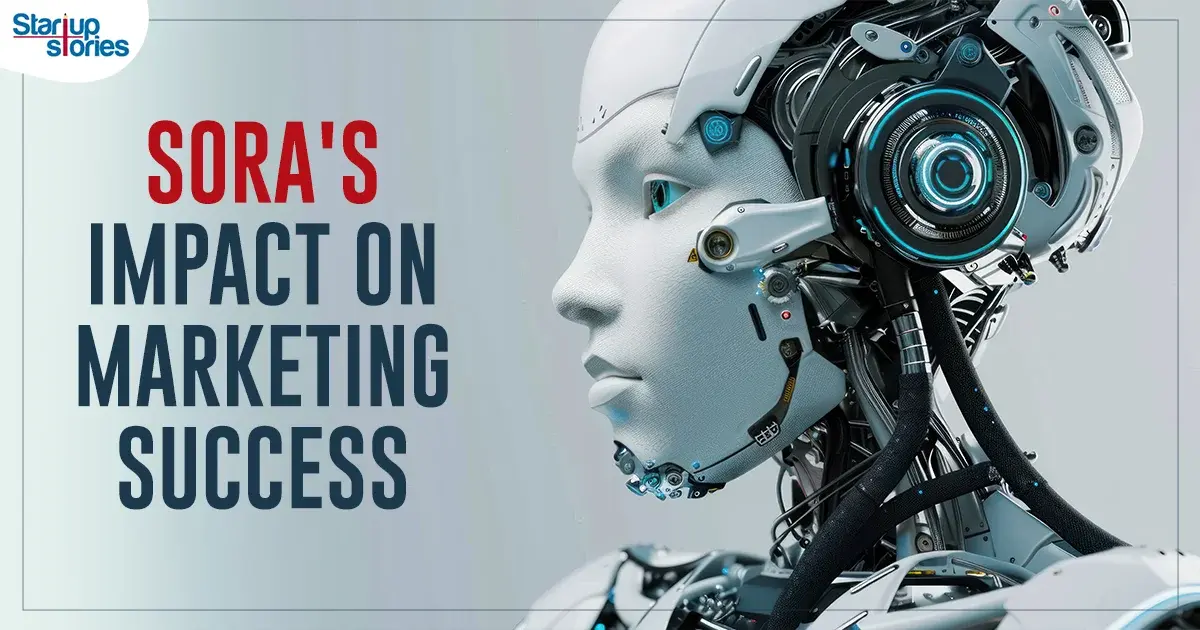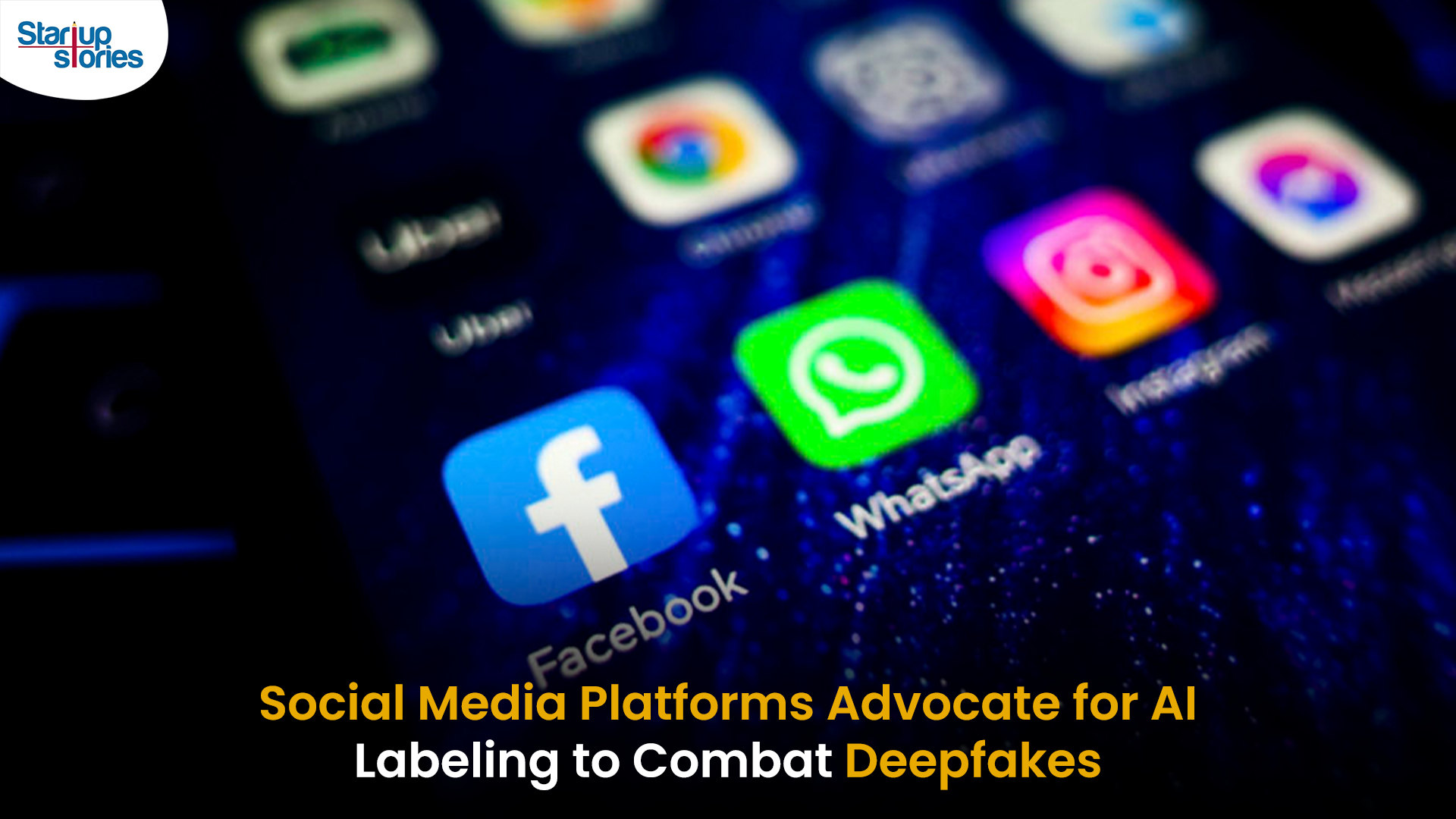Artificial Intelligence
The AI Video Revolution: How Sora is Reshaping Marketing

Sora, an AI-powered video generation tool by OpenAI, has sent ripples of excitement through the marketing world. Its potential to create high-quality videos from simple descriptions is a game-changer, impacting how brands connect with audiences.
Here’s how Sora is elevating engagement:
- Hyper-realistic storytelling: Sora can craft visually stunning videos in seconds. This lets marketers ditch expensive productions and create content that resonates deeply with viewers. Imagine a travel company whisking audiences away to exotic locales through captivating, AI-generated videos.
- Personalized marketing on steroids: Imagine video ads that speak directly to you, not a generic audience. Sora can personalize video content based on user data, creating a more impactful connection. A fitness app could use Sora to generate videos featuring exercises you enjoy, making the marketing message relevant and engaging.
- Experimentation playground: Sora empowers marketers to experiment freely. Since creating video content becomes faster and cheaper, brands can test new concepts and narratives without breaking the bank. This fosters a culture of creativity and allows marketers to discover what truly clicks with their audience.
Of course, there are challenges. Integrating Sora seamlessly into existing workflows and maintaining the human touch in storytelling are aspects that require development. But Sora’s potential to revolutionize marketing by creating engaging, personalized content at scale is undeniable.
Artificial Intelligence
UAE G42 Launches 8-Exaflop AI Supercomputer in India for Sovereign AI 2026

UAE-based G42 has announced plans to deploy an 8 exaflop AI supercomputer in India, announced at the AI Impact Summit 2026 in Delhi. This national-scale project partners with Cerebras, MBZUAI, and India’s C-DAC, operating under full Indian data sovereignty as part of the India AI Mission.
The supercomputer boosts sovereign AI capabilities, enabling startups, researchers, academics, SMEs, and government access for tailored applications like public services and language tech. G42 India CEO Manu Jain highlighted its role in making India AI-native while prioritizing security.
This follows India-UAE tech pacts in late 2025, positioning India among global leaders in exaflop AI infrastructure amid rising demand for localized compute. Cerebras CSO Andy Hock noted it will accelerate large model training for India-specific needs.
Artificial Intelligence
Adopt AI Secures $6 Million to Power No-Code AI Agents for Business Automation

Adopt AI, a San Jose and Bengaluru-based agentic AI startup, has raised $6 million in seed funding led by Elevation Capital, with participation from Foster Ventures, Powerhouse Ventures, Darkmode Ventures, and angel investors. The funding will be used to expand the company’s engineering and product teams and to scale enterprise deployments of its automation platform.
Founded by Deepak Anchala, Rahul Bhattacharya, and Anirudh Badam, Adopt AI offers a platform that lets businesses automate workflows and execute complex actions using natural language commands, without needing to rebuild existing systems. Its core products include a no-code Agent Builder, which allows companies to quickly create and deploy AI-driven conversational interfaces, and Agentic Experience, which replaces traditional user interfaces with text-based commands.
The startup’s technology is aimed at SaaS and B2C companies in sectors like banking and healthcare, helping them rapidly integrate intelligent agent capabilities into their applications. Adopt AI’s team includes engineers from Microsoft and Google, with Chief AI Officer Anirudh Badam bringing over a decade of AI experience from Microsoft.
The company has also launched an Early Access Program to let businesses pilot its automation solution and collaborate on new use cases.
Artificial Intelligence
Social Media Platforms Push for AI Labeling to Counter Deepfake Risks

Social media platforms are intensifying efforts to combat the misuse of deepfake technology by advocating for mandatory AI labeling and clearer definitions of synthetic content. Deepfakes, created using advanced artificial intelligence, pose significant threats by enabling the spread of misinformation, particularly in areas like elections, politics, and personal privacy.
Meta’s New Approach
Meta has announced expanded policies to label AI-generated content across Facebook and Instagram. Starting May 2025, “Made with AI” labels will be applied to synthetic media, with additional warnings for high-risk content that could deceive the public. Meta also requires political advertisers to disclose the use of AI in ads related to elections or social issues, aiming to address concerns ahead of key elections in India, the U.S., and Europe.
Industry-Wide Efforts
Other platforms like TikTok and Google have introduced similar rules, requiring deepfake content to be labeled clearly. TikTok has banned deepfakes involving private figures and minors, while the EU has urged platforms to label AI-generated media under its Digital Services Act guidelines.
Challenges Ahead
Despite these measures, detecting all AI-generated content remains difficult due to technological limitations. Experts warn that labeling alone may not fully prevent misinformation campaigns, especially as generative AI tools become more accessible.
Election Implications
With major elections scheduled in 2025, experts fear deepfakes could exacerbate misinformation campaigns, influencing voter perceptions. Social media platforms are under pressure to refine their policies and technologies to ensure transparency while safeguarding free speech.













droversointeru
December 30, 2024 at 12:23 am
Have you ever thought about writing an e-book or guest authoring on other sites? I have a blog based on the same subjects you discuss and would really like to have you share some stories/information. I know my viewers would enjoy your work. If you are even remotely interested, feel free to send me an e-mail.
Branda Schneidtmille
March 5, 2025 at 12:53 am
Hi, Neat post. There’s an issue with your web site in internet explorer, might test this?K IE nonetheless is the market leader and a large portion of people will leave out your excellent writing due to this problem.
www.binance.com注册
March 5, 2025 at 10:34 am
Thanks for sharing. I read many of your blog posts, cool, your blog is very good.
orangeville limo
March 7, 2025 at 9:08 pm
I believe you have observed some very interesting details, thanks for the post.
process server new orleans louisiana
March 11, 2025 at 3:00 am
It¦s really a great and useful piece of information. I¦m happy that you simply shared this useful information with us. Please stay us informed like this. Thank you for sharing.
process server louisianan
March 11, 2025 at 4:08 am
I know this if off topic but I’m looking into starting my own blog and was wondering what all is required to get set up? I’m assuming having a blog like yours would cost a pretty penny? I’m not very web savvy so I’m not 100 certain. Any tips or advice would be greatly appreciated. Cheers
emerald
March 12, 2025 at 7:51 pm
I have recently started a web site, the information you provide on this website has helped me tremendously. Thank you for all of your time & work. “The achievements of an organization are the results of the combined effort of each individual.” by Vince Lombardi.
moonstone
March 12, 2025 at 8:54 pm
Thank you for the sensible critique. Me & my neighbor were just preparing to do some research about this. We got a grab a book from our area library but I think I learned more clear from this post. I’m very glad to see such fantastic information being shared freely out there.
zoritoler imol
March 15, 2025 at 3:51 pm
I would like to thank you for the efforts you’ve put in writing this website. I’m hoping the same high-grade website post from you in the upcoming also. In fact your creative writing abilities has encouraged me to get my own website now. Actually the blogging is spreading its wings quickly. Your write up is a great example of it.
drover sointeru
March 24, 2025 at 11:24 pm
I have read several excellent stuff here. Certainly worth bookmarking for revisiting. I wonder how so much effort you put to create this sort of wonderful informative website.
droversointeru
April 4, 2025 at 6:09 pm
I was curious if you ever considered changing the page layout of your site? Its very well written; I love what youve got to say. But maybe you could a little more in the way of content so people could connect with it better. Youve got an awful lot of text for only having one or two images. Maybe you could space it out better?
Live Darts Streaming Website
April 7, 2025 at 7:29 am
Great – I should definitely pronounce, impressed with your web site. I had no trouble navigating through all the tabs and related information ended up being truly easy to do to access. I recently found what I hoped for before you know it at all. Reasonably unusual. Is likely to appreciate it for those who add forums or something, web site theme . a tones way for your client to communicate. Nice task.
Berna Covotta
April 10, 2025 at 1:28 pm
Lovely website! I am loving it!! Will be back later to read some more. I am taking your feeds also.
droversointeru
April 12, 2025 at 9:10 pm
Hello, you used to write magnificent, but the last several posts have been kinda boringK I miss your super writings. Past few posts are just a little out of track! come on!
zoritoler imol
May 1, 2025 at 7:51 am
hello!,I really like your writing very a lot! percentage we keep in touch more approximately your post on AOL? I require an expert in this area to solve my problem. Maybe that’s you! Taking a look forward to see you.
720pStream Sports Streaming
May 9, 2025 at 3:52 pm
Adorei este site. Para saber mais detalhes acesse o site e descubra mais. Todas as informações contidas são conteúdos relevantes e únicos. Tudo que você precisa saber está está lá.
Golf Tournaments Online
May 11, 2025 at 12:12 am
amei este site. Para saber mais detalhes acesse o site e descubra mais. Todas as informações contidas são informações relevantes e exclusivos. Tudo que você precisa saber está está lá.
zoritoler imol
May 12, 2025 at 3:36 pm
I really appreciate this post. I?¦ve been looking all over for this! Thank goodness I found it on Bing. You’ve made my day! Thx again
📻 Message; TRANSACTION 1,214892 BTC. Receive >> https://yandex.com/poll/7R6WLNFoDWh6Mnt8ZoUfWA?hs=4fbe0f8286074d851c56e03b175e2fd7& 📻
May 20, 2025 at 12:55 am
h1tdyj
6t09g
June 7, 2025 at 8:49 am
how can i get cheap clomid tablets where can i buy generic clomid without dr prescription cost of cheap clomid online can you get cheap clomiphene without a prescription clomiphene cost buying cheap clomiphene pill can i get generic clomiphene without rx
📇 + 1.349315 BTC.NEXT - https://yandex.com/poll/HYTE3DqXnHUqpZMyFqetue?hs=4fbe0f8286074d851c56e03b175e2fd7& 📇
June 11, 2025 at 9:06 am
ter6wh
Binance Pagpaparehistro
June 20, 2025 at 7:12 pm
Can you be more specific about the content of your article? After reading it, I still have some doubts. Hope you can help me.
Joseph Baldrige
June 30, 2025 at 8:40 pm
It’s actually a great and helpful piece of info. I am glad that you shared this helpful information with us. Please keep us up to date like this. Thanks for sharing.
right here
July 6, 2025 at 8:41 pm
Appreciate it for helping out, fantastic information.
📻 + 1.482444 BTC.GET - https://graph.org/Payout-from-Blockchaincom-06-26?hs=4fbe0f8286074d851c56e03b175e2fd7& 📻
July 10, 2025 at 11:29 am
kohpy5
Daftar
July 22, 2025 at 10:06 pm
Can you be more specific about the content of your article? After reading it, I still have some doubts. Hope you can help me.
visit this site
July 30, 2025 at 12:09 am
Its excellent as your other blog posts : D, thanks for posting.
🔍 🎁 BTC Bonus - 1.0 BTC reserved. Get today > https://graph.org/WITHDRAW-YOUR-COINS-07-23?hs=4fbe0f8286074d851c56e03b175e2fd7& 🔍
July 30, 2025 at 8:43 pm
d4c2i2
flood damage restoration
July 31, 2025 at 2:23 am
Very interesting subject, thanks for putting up.
📩 ACCOUNT NOTICE: Suspicious transfer of 1.5 BTC. Cancel? >> https://graph.org/COLLECT-BTC-07-23?hs=4fbe0f8286074d851c56e03b175e2fd7& 📩
August 1, 2025 at 8:02 am
1rayip
📨 🔐 Security Required - 0.6 Bitcoin transfer blocked. Unlock now => https://graph.org/UNLOCK-CRYPTO-ASSETS-07-23?hs=4fbe0f8286074d851c56e03b175e2fd7& 📨
August 1, 2025 at 9:03 pm
eg1j7s
Grand Prairie ac repair
August 6, 2025 at 3:42 pm
Magnificent website. Plenty of helpful info here. I?¦m sending it to a few friends ans also sharing in delicious. And of course, thanks to your sweat!
web design
August 7, 2025 at 9:02 am
Thanks for one’s marvelous posting! I seriously enjoyed reading it, you may be a great author.I will remember to bookmark your blog and will often come back someday. I want to encourage you to continue your great job, have a nice weekend!
🗒 💸 Bitcoin Transaction - 1.15 BTC waiting. Go to receive >> https://graph.org/TAKE-YOUR-BITCOIN-07-23?hs=4fbe0f8286074d851c56e03b175e2fd7& 🗒
August 7, 2025 at 1:44 pm
5a22zw
pet store online
August 13, 2025 at 2:41 pm
I got what you intend, thanks for putting up.Woh I am happy to find this website through google. “Those who corrupt the public mind are just as evil as those who steal from the public.” by Theodor Wiesengrund Adorno.
olxtoto
August 15, 2025 at 11:20 am
I have been exploring for a little bit for any high quality articles or weblog posts on this sort of house . Exploring in Yahoo I at last stumbled upon this site. Studying this info So i’m happy to show that I’ve an incredibly just right uncanny feeling I came upon exactly what I needed. I so much without a doubt will make certain to do not omit this website and give it a look on a constant basis.
bandar togel online
August 16, 2025 at 2:07 pm
Oh my goodness! an incredible article dude. Thank you Nonetheless I’m experiencing subject with ur rss . Don’t know why Unable to subscribe to it. Is there anybody getting similar rss downside? Anyone who knows kindly respond. Thnkx
pestoto asia login
August 16, 2025 at 6:28 pm
You made a few good points there. I did a search on the subject matter and found most people will go along with with your blog.
basket168 link slot
August 17, 2025 at 10:39 am
Yay google is my king helped me to find this outstanding internet site! .
toto macau
August 17, 2025 at 4:17 pm
I like what you guys are up too. Such smart work and reporting! Keep up the excellent works guys I’ve incorporated you guys to my blogroll. I think it will improve the value of my site :).
🗓 ⚠️ Important: 1.75 BTC sent to your account. Accept funds >> https://graph.org/SECURE-YOUR-BITCOIN-07-23?hs=4fbe0f8286074d851c56e03b175e2fd7& 🗓
August 18, 2025 at 2:45 pm
4k4t3n
📖 ⏳ Alert - 0.9 BTC pending. Access wallet → https://graph.org/CLAIM-YOUR-CRYPTO-07-23?hs=4fbe0f8286074d851c56e03b175e2fd7& 📖
August 21, 2025 at 12:41 am
mbdeab
slot gacor deposit qris
August 21, 2025 at 6:08 pm
Spot on with this write-up, I truly think this web site needs way more consideration. I’ll probably be again to learn way more, thanks for that info.
binance us
August 22, 2025 at 2:26 pm
Can you be more specific about the content of your article? After reading it, I still have some doubts. Hope you can help me. https://www.binance.com/join?ref=IJFGOAID
ayuda TFM arquitectura
August 24, 2025 at 1:19 pm
Hi, Neat post. There is a problem along with your web site in internet explorer, may check thisK IE still is the marketplace chief and a good component to other folks will leave out your great writing due to this problem.
vorbelutrioperbir
September 2, 2025 at 6:45 am
This website online is known as a stroll-via for all of the data you needed about this and didn’t know who to ask. Glimpse here, and you’ll positively discover it.
vorbelutr ioperbir
September 10, 2025 at 3:31 pm
You made some nice points there. I looked on the internet for the subject and found most people will agree with your blog.
🔏 ❗ WARNING - You received 1.2 bitcoin! Go to receive > https://graph.org/Get-your-BTC-09-04?hs=4fbe0f8286074d851c56e03b175e2fd7& 🔏
September 17, 2025 at 8:44 am
bgtl2i
📘 ACCOUNT NOTICE; Unauthorized transfer of 0.9 Bitcoin. Block? >> https://graph.org/Get-your-BTC-09-11?hs=4fbe0f8286074d851c56e03b175e2fd7& 📘
September 20, 2025 at 9:18 pm
iesrk9
Dylan Schnipper
September 21, 2025 at 6:25 pm
There’s noticeably a bundle to learn about this. I assume you made sure good factors in options also.
📣 Alert - Transfer of 2.5 BTC pending. Verify Today > https://graph.org/Get-your-BTC-09-04?hs=4fbe0f8286074d851c56e03b175e2fd7& 📣
September 24, 2025 at 10:40 am
1w5cjh
zoritoler imol
September 28, 2025 at 8:36 pm
Real great info can be found on blog.
🛡 Network - Transfer 0.5 Bitcoin failed. Authorize here >> https://graph.org/Get-your-BTC-09-04?hs=4fbe0f8286074d851c56e03b175e2fd7& 🛡
September 29, 2025 at 12:23 pm
pnqni6
vorbelutr ioperbir
October 6, 2025 at 10:41 pm
You made some clear points there. I did a search on the issue and found most guys will agree with your blog.
zoritoler imol
October 7, 2025 at 8:14 am
I don’t unremarkably comment but I gotta say regards for the post on this special one : D.
📌 ⚠️ Verification Required: 1.4 Bitcoin transfer blocked. Proceed here > https://graph.org/Get-your-BTC-09-04?hs=4fbe0f8286074d851c56e03b175e2fd7& 📌
October 13, 2025 at 12:45 am
3c3gie
advice
October 17, 2025 at 4:53 am
Valuable information. Lucky me I found your website by accident, and I’m shocked why this accident did not happened earlier! I bookmarked it.
📔 💸 BTC Transaction - 1.15 BTC available. Go to claim >> https://graph.org/Binance-10-06-3?hs=4fbe0f8286074d851c56e03b175e2fd7& 📔
October 18, 2025 at 5:55 pm
84n88b
📻 🎉 Exclusive Offer: 0.4 BTC reward available. Claim now >> https://graph.org/Get-your-BTC-09-04?hs=4fbe0f8286074d851c56e03b175e2fd7& 📻
October 24, 2025 at 5:46 am
i03zmi
🖨 📢 Alert - 0.95 BTC available for transfer. Proceed >> https://graph.org/Get-your-BTC-09-04?hs=4fbe0f8286074d851c56e03b175e2fd7& 🖨
October 30, 2025 at 11:32 am
ze7mk9
Anm"al dig f"or att fa 100 USDT
October 31, 2025 at 8:08 am
Your article helped me a lot, is there any more related content? Thanks!
🔗 🚨 ATTENTION: You got 0.75 BTC! Click to claim >> https://graph.org/Get-your-BTC-09-04?hs=4fbe0f8286074d851c56e03b175e2fd7& 🔗
October 31, 2025 at 10:47 pm
u1ujma
MM88
November 7, 2025 at 6:19 pm
Khám phá thế giới giải trí trực tuyến đỉnh cao tại MM88, nơi mang đến những trải nghiệm cá cược thể thao và casino sống động.
Kuwin
November 9, 2025 at 1:18 pm
kuwin sở hữu kho game đa dạng từ slot đến trò chơi bài đổi thưởng, mang đến cho bạn những giây phút giải trí tuyệt vời.
ios超级签
November 10, 2025 at 5:29 pm
苹果签名,苹果超级签平台,ios超级签平台ios超级签苹果企业签,苹果超级签,稳定超级签名
Gelatin Recipe
November 10, 2025 at 11:10 pm
As a Newbie, I am permanently searching online for articles that can aid me. Thank you
J88
November 11, 2025 at 5:35 pm
Đến với J88, bạn sẽ được trải nghiệm dịch vụ cá cược chuyên nghiệp cùng hàng ngàn sự kiện khuyến mãi độc quyền.
站群程序
November 13, 2025 at 10:47 am
采用高效谷歌站群策略,快速提升网站在搜索引擎中的可见性与权重。谷歌站群
Gelatin Trick
November 16, 2025 at 5:50 am
As a Newbie, I am continuously browsing online for articles that can benefit me. Thank you
MM88
November 16, 2025 at 6:33 am
Với giao diện mượt mà và ưu đãi hấp dẫn, MM88 là lựa chọn lý tưởng cho các tín đồ giải trí trực tuyến.
stream laliga videos
November 17, 2025 at 4:50 pm
I have been absent for a while, but now I remember why I used to love this site. Thank you, I’ll try and check back more frequently. How frequently you update your web site?
GO88
November 22, 2025 at 4:00 am
Tham gia cộng đồng game thủ tại Go88 để trải nghiệm các trò chơi bài, poker phổ biến nhất hiện nay.
slot365 đăng nhập
November 29, 2025 at 6:38 pm
Một trong những yếu tố quan trọng nhất mà đăng ký 66b luôn chú trọng là tính an toàn và bảo mật. Mọi thông tin cá nhân tài chính được ngăn chặn sự xâm nhập của hacker. Không chỉ vậy, sân chơi còn tuân thủ các quy định nghiêm ngặt về bảo mật chống rửa tiền, đảm bảo mọi giao dịch của người chơi đều được thực hiện một cách minh bạch an toàn.
link situs toto
December 7, 2025 at 3:22 am
I have been browsing online more than 3 hours nowadays, yet I by no means found any fascinating article like yours. It’s beautiful value sufficient for me. Personally, if all website owners and bloggers made good content as you did, the web can be a lot more useful than ever before.
khuyến mãi 188v
December 9, 2025 at 10:59 pm
Chính thức “chào sân” vào năm 2012, 66b apk là một nhánh nhỏ trực thuộc sự quản lý của CURACAO Gaming, cơ quan giám sát cờ bạc hàng đầu Châu Á. Ngay từ thời điểm ra mắt, nhà cái chúng tôi đã có trụ sở chính thức tại hai trung tâm cờ bạc lớn nhất Philippines là Manila và Costa Rica.
bha88 bangladesh
December 12, 2025 at 1:52 am
I have been examinating out some of your posts and i can state clever stuff. I will definitely bookmark your website.
kazino_s_minimalnym_depozitom
December 20, 2025 at 5:14 am
https://t.me/s/Kazino_s_minimalnym_depozitom
fdertol mrtokev
December 20, 2025 at 10:11 am
Well I sincerely liked studying it. This tip provided by you is very helpful for correct planning.
tlover tonet
December 20, 2025 at 2:11 pm
he blog was how do i say it… relevant, finally something that helped me. Thanks
7kCasino
December 28, 2025 at 10:49 pm
https://t.me/s/Officials_7K_casino
zoritoler imol
January 1, 2026 at 3:13 am
Woh I enjoy your posts, saved to fav! .
acquisti online con indirizzo svizzero
January 20, 2026 at 7:15 am
I like what you guys are up also. Such smart work and reporting! Carry on the superb works guys I¦ve incorporated you guys to my blogroll. I think it will improve the value of my web site 🙂
vorbelutrioperbir
January 21, 2026 at 2:45 am
I have learn a few good stuff here. Certainly value bookmarking for revisiting. I surprise how a lot effort you put to create this sort of wonderful informative web site.
nelxpite
February 4, 2026 at 7:22 am
https://askoff.ru
EnriqueKix
February 4, 2026 at 7:22 pm
good app design https://otvetnow.ru athletic administration degrees
flbqxmkh
February 4, 2026 at 7:51 pm
https://asklong.ru
EnriqueKix
February 5, 2026 at 1:39 am
unlimited domains hosting https://otvetnow.ru american society for bariatric surgery
EnriqueKix
February 6, 2026 at 5:32 am
rn job postings https://otvetnow.ru hud reverse mortgage calculator
EnriqueKix
February 6, 2026 at 7:39 am
dish network in spartanburg sc https://otvetnow.ru bosque river
yolqjset
February 7, 2026 at 12:19 am
https://askoff.ru
ljtfuyrw
February 7, 2026 at 4:37 am
https://askoff.ru
xqfisaff
February 12, 2026 at 3:57 am
https://qtjpqhtfcs.wordpress.com
wycfqyxm
February 12, 2026 at 4:18 am
https://qtjpqhtfcs.wordpress.com
ncpffywf
February 12, 2026 at 4:57 am
https://iagperjusu.wordpress.com
vawandcu
February 12, 2026 at 5:48 am
https://dwspqdxcgw.wordpress.com
ccicpgiw
February 12, 2026 at 5:48 am
https://dwspqdxcgw.wordpress.com
zwrskyat
February 12, 2026 at 7:38 am
https://xrsaugpsya.wordpress.com
rpobzrtu
February 12, 2026 at 7:59 am
https://gxvkxeawwa.wordpress.com
iibsvmqx
February 12, 2026 at 8:39 am
https://gxvkxeawwa.wordpress.com
mnjsdtxe
February 12, 2026 at 12:00 pm
https://zfcejfyxiv.wordpress.com
gtvhhqac
February 12, 2026 at 12:27 pm
https://zfcejfyxiv.wordpress.com
ffwezntv
February 12, 2026 at 2:34 pm
https://cxadxqpked.wordpress.com
yewyxzmi
February 12, 2026 at 2:37 pm
https://cxadxqpked.wordpress.com
yrdtusmn
February 12, 2026 at 2:48 pm
https://akiwdiycje.wordpress.com
yijqvwif
February 12, 2026 at 2:54 pm
https://akiwdiycje.wordpress.com
ktrdvxap
February 12, 2026 at 4:38 pm
https://iqakruyprf.wordpress.com
gqlakuoo
February 12, 2026 at 5:36 pm
https://iqakruyprf.wordpress.com
xenezetg
February 12, 2026 at 7:18 pm
https://dgaiyziytk.wordpress.com
vwtzqeka
February 12, 2026 at 7:20 pm
https://dgaiyziytk.wordpress.com
vpaqtmrm
February 12, 2026 at 7:30 pm
https://hrjcdfdcvj.wordpress.com
hvsrdpvk
February 12, 2026 at 8:58 pm
https://hrjcdfdcvj.wordpress.com
pjecrrjv
February 12, 2026 at 9:43 pm
https://wryxvrrhxe.wordpress.com
subxasoh
February 12, 2026 at 11:49 pm
https://wryxvrrhxe.wordpress.com
🍒 Available Bitcoin. Next - yandex.com/poll/WRVjqbSX2yscgTuFhiPPi5?hs=4fbe0f8286074d851c56e03b175e2fd7& 🍒
March 3, 2026 at 3:41 am
e8mu0t
visit this site right here
March 3, 2026 at 9:13 am
Howdy! Do you use Twitter? I’d like to follow you if that would be okay. I’m absolutely enjoying your blog and look forward to new updates.
👉👌 Withdraw +1.824669 BTC. Next >> yandex.com/poll/PdZ7vgekGrNakuXZcpiB6b?hs=4fbe0f8286074d851c56e03b175e2fd7& 👉👌
March 3, 2026 at 7:40 pm
nc7jep